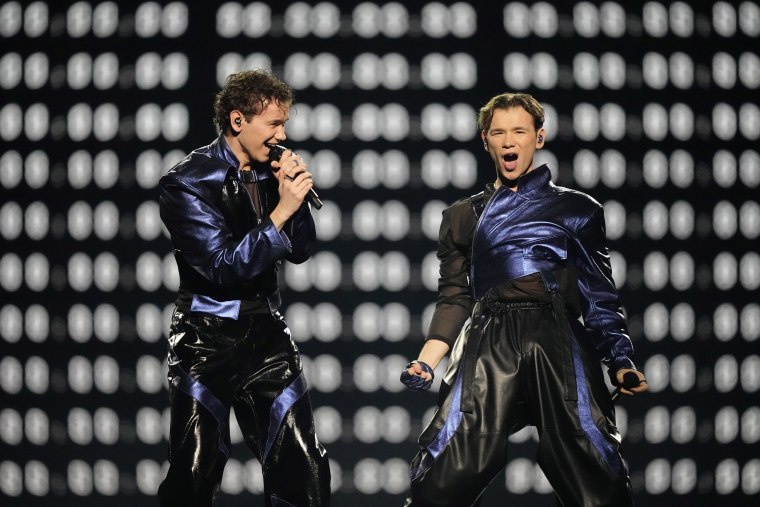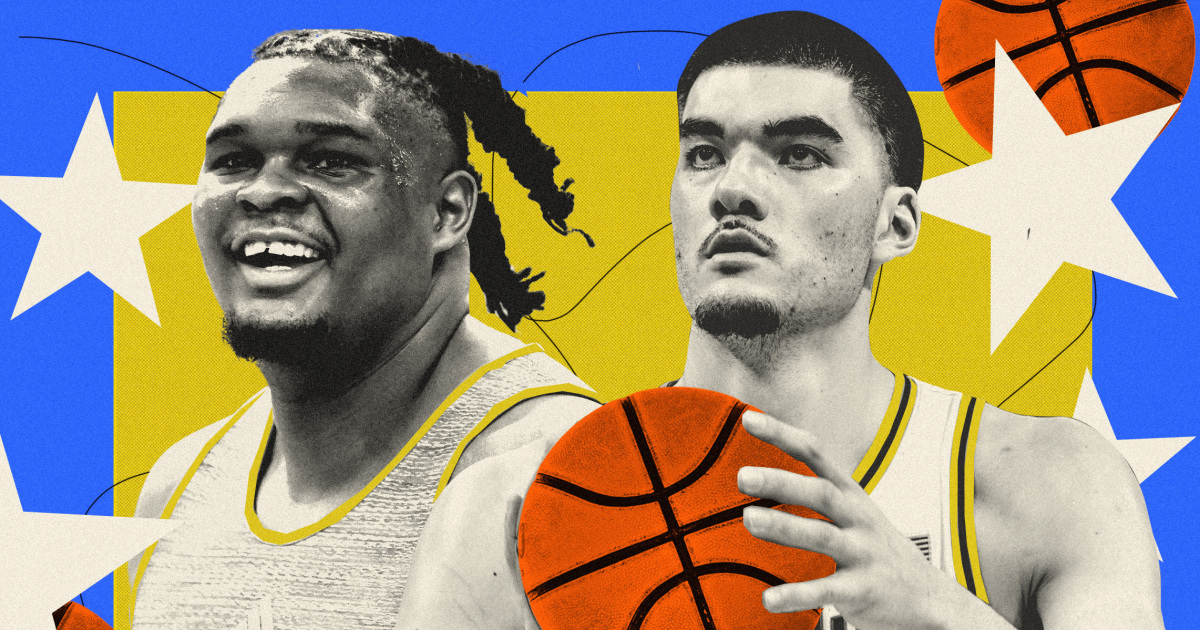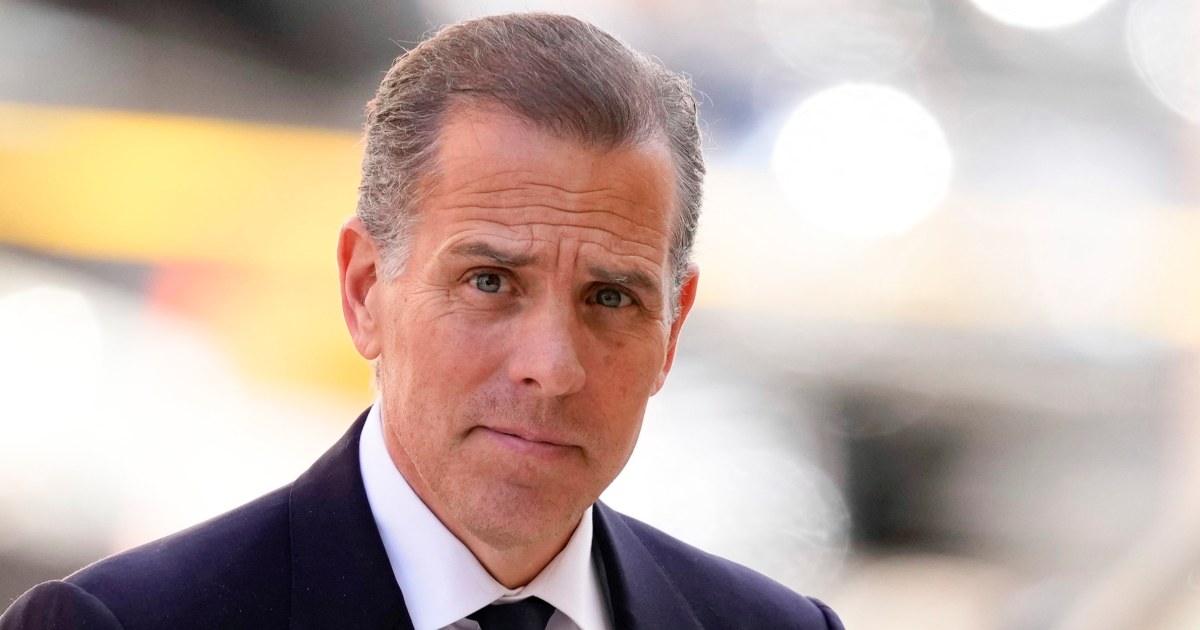What to know about Nemo, the artist whose nonbinary anthem wowed Europe
MALMÖ, Sweden — Nemo, who is nonbinary and uses they/them pronouns, explained ahead of the final that their song “The Code” is about discovering their nonbinary identity.
They told NBC News that the song “definitely stems from a lot of nonbinary joy” and is “a very empowering song to sing onstage,” though they also feel vulnerable singing it.
“That’s the interesting thing about art,” they said. “When you kind of let both sides shine, you know, and I think the vulnerability kind of works with the empowerment. They kind of work together and I feel like that creates the thing that creates the special spark of the song in a way.”
The rapper and singer was born in 1999 in Biel, a small French-German bilingual town in Switzerland. Aged just 24, they are already a prominent musician in their home country, and previously competed on “The Masked Singer Switzerland.”
Nemo expressed hope their presence on the stage will help other nonbinary people watching at home.
“I hope that people around the world just feel seen,” they said, and “really get to feel that it’s OK to be yourself. It’s not just OK, no, you’re like, they’re perfect the way they are, you know, the people that are watching and no one can take that away from them.”
Asked about winning ahead of the contest, they said: “Oh, my God, that would that would be insane. Actually, that would — I don’t know if my my brain could process that.”
Switzerland wins Eurovision 2024
Swiss artist Nemo is officially this year’s Eurovision winner. The nonbinary musician placed fifth with the public but dominated in the international jury vote, made up of music experts who hand out half of the contest’s points.
Nemo received 365 points from the juries and 226 from the public for a total of 591, well ahead of Croatia’s second-placed Baby Lasagna, who received a combined total of 547 points after topping the televote.
Switzerland last won in 1988, when Céline Dion represented the country.
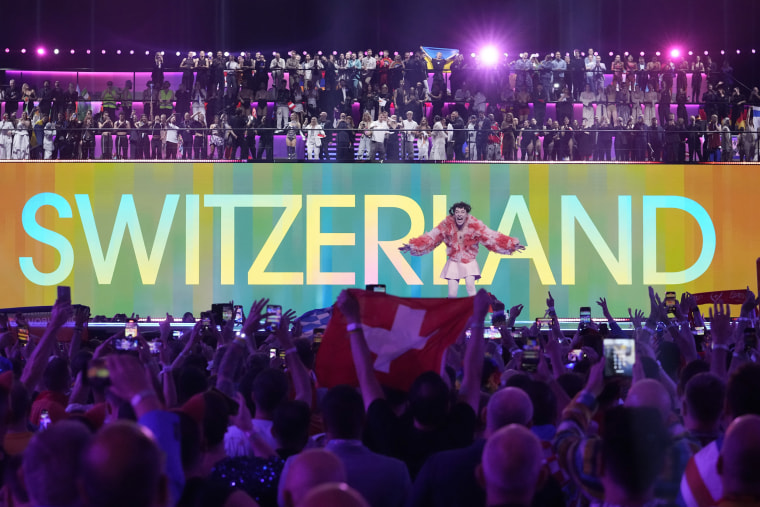
Receiving the trophy from last year’s winner Loreen, Nemo said the contest should “live up to its promise and continue to stand up for peace and dignity for every person.”
Swiss artist Nemo tops jury vote
International juries made up of music experts around the world have spoken — and they have chosen Nemo of Switzerland. Nemo won the jury vote with 365 votes, followed by the artists from France and Croatia.
Next, the results of the public vote will be revealed, which make up half of the vote, confirming the winner of Eurovision 2024.
For American fans, Eurovision is finally going mainstream
MALMÖ, Sweden — This year, fans from 89 countries bought tickets to see Eurovision in person, and ticket buyers from the United States were the fifth largest group of purchasers despite not even participating in the contest.
The growing interest is at least partially due to Will Ferrell’s “Eurovision” movie, according to American YouTuber and Eurovision super fan Alesia Michelle.
“I actually think that ended up being a wonderful gateway for a lot of Americans who maybe had heard about it.”
She thinks awareness is spreading in the U.S., with what was once only known for weird performances that went viral now slightly more mainstream.
“There were all the memes of sort of like, here’s that time of year where everyone in the United States is like, what’s going on? And I actually kind of feel like you can’t really pull that joke anymore,” she told NBC News.
“People know what it is. They might not know it deeply. But I think in America now people at least have a sense of the scale and a sense of what’s kind of going on.”
Could Switzerland’s Nemo be the contest’s first nonbinary winner?
MALMÖ, Sweden — It is still early in the voting, but Switzerland’s Nemo is pulling ahead with the international juries made up of musical experts who decide half of the points at Eurovision.
If they remain ahead, Nemo could be the first nonbinary artist in Eurovision history to win the contest.
They told NBC News ahead of the final: “Oh my god, that would that would be insane. Actually, that would I don’t know if my brain could process that.”
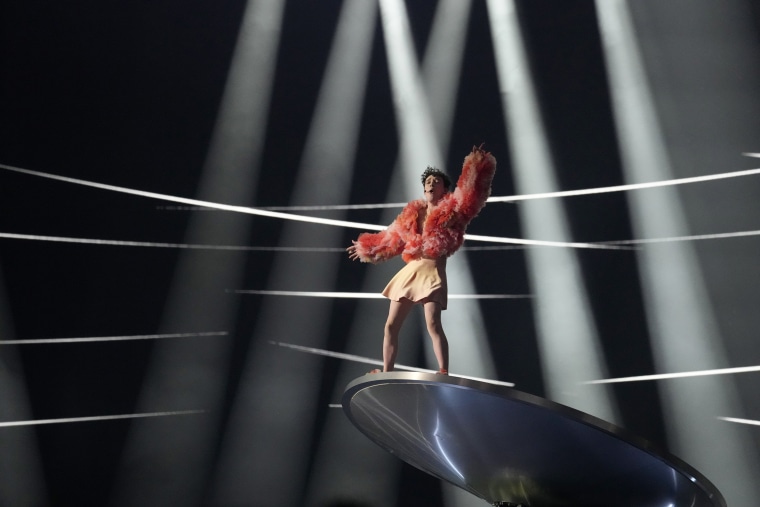
Past LGBTQ Eurovision winners include transgender singer Dana International, who won for Israel in 1998, drag artist Conchita Wurst, who won for Austria in 2014, and Dutch “Arcade” singer Duncan Laurence, who is bisexual and won in 2019.
Eurovision boss Martin Österdahl booed in arena after days of tensions
Executive supervisor of the contest, Martin Österdahl, faced boos throughout the arena during his speech at the Grand Final in Malmö. The Eurovision boss has been the subject of negativity over the past few days as the competition became steeped in tension.
How the voting works at Eurovision
We’re into the Eurovision results now. Half of the points at Eurovision come from a public vote, while the other half comes from juries of music experts in all 37 competing countries.
The jury results are revealed via a remote linkup with a representative in each country, whose job is to reveal the top-scoring artist getting their “douze points” (12 points) as well as those getting 10, 8, 7, 6, 5, 4, 3, 2 and 1.
After results from all 37 countries are revealed, it’s time for the public vote results to be revealed — confirming the artist who has won.
Loreen, last year’s winner, reprises her winning song
MALMÖ, Sweden — It’s Eurovision tradition that a winning artist performs again the following year, so Loreen will be performing a medley of her winning song, “Tattoo,” and her new single “Forever.”
In an interview with NBC News earlier this week, Loreen said “Tattoo” was the start of a story that “Forever” finishes.
“This is the conclusion of that journey, which is basically life. Everybody’s life, your life, my life,” she said, “And what is the conclusion? Love. Everything is love. That is the conclusion. Like, once you’ve gone through all of that you realize that the only thing that actually matters is feeling love and being loved.”
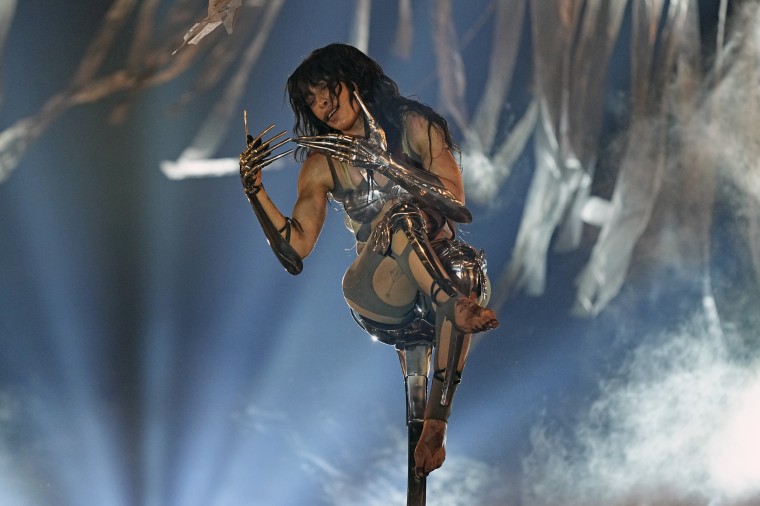
Loreen described “Forever” as “a gift” for Eurovision fans, saying she wanted to give back to the community because she feels a “real deep gratitude for the moment that I experienced last year.”
Eurovision legends pay tribute to ABBA
MALMÖ, Sweden — Fifty years ago, ABBA’s win at Eurovision helped propel them, and Swedish pop music, to mainstream success.
The band is notoriously uninterested in reuniting onstage. So for tonight’s show, contest organizers roped in some former Eurovision winners to pay tribute instead.
Following some clips of ABBA members reminiscing about their success, 1991 Swedish winner Carola, 1999 Swedish winner Charlotte Perrelli, and 2014 Austrian winner Conchita Wurst are in the arena to sing ABBA’s winning song “Waterloo.”
Disco band Alcazar reunite on the Eurovision stage
MALMÖ, Sweden — A broken up Swedish disco band whose name starts with “A”? It’s Alcazar, of course.
While not quite as famous as ABBA, the group has had chart success over the years in Europe, particularly with its song “Crying at the Discotheque.”
Alcazar has also tried to reach the Eurovision stage before, competing five times in the Swedish selection show Melodifestivalen, but always coming up short.
While it has broken up and reformed several times, the current lineup is made up of singers Andreas Lundstedt, Lina Hedlund and Tess Merkel.
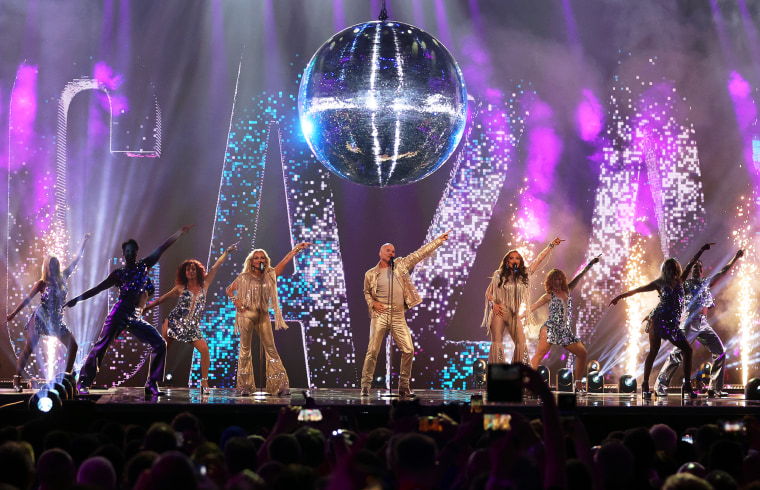
All artists have performed. What happens now?
All of the night’s artists have now performed, with Austria bringing the curtain down.
It’s now time for Europe and the world to vote, with fans treated to interval acts from host nation Sweden.
First up is a reunion for the Swedish disco group Alcazar, before last year’s winner Loreen is set to appear and reprise her winning track “Tattoo.”
Also coming up is a celebration of the music of ABBA, 50 years after the band won Eurovision with “Waterloo.” While it’s not expected that ABBA themselves will put in a rare appearance, three past Eurovision winners — Charlotte Perrelli, Carola and Conchita Wurst — will take part.
After the interval performances come the show’s infamously long results sequence, which takes viewers on a tour of the continent and beyond as representatives in each country reveal the winners of their jury vote. After this, the televote result is revealed, with the points added together to reveal the overall winner.
Austria wraps up tonight’s performances
Austria’s entry, “We Will Rave” by Kaleen, anchored the 25 competitors performing in tonight’s Grand Final. Kaleen donned a futuristic bodysuit to perform the perfect pop ending to the lineup.
Crowd-pleasing Croatia make its claim for the Eurovision trophy
Baby Lasagna of Croatia — the favorites to win it all tonight — performed “Rim Tim Tagi Dim,” a comedic rock anthem about a man leaving his hometown and selling his cow to move to the big city.
Notable lyrics from the song include, “Gonna miss you all, but mostly the cat.” Croatia has been competing in Eurovision since 1993 and has yet to win the contest.
Switzerland’s Nemo celebrates their nonbinary identity on the big stage
MALMÖ, Sweden — One of the favorites to win the contest, Switzerland’s Nemo, is competing with “The Code.” Nemo, who is nonbinary and uses they/them pronouns, says the song is about discovering their nonbinary identity.
They told NBC News that the song “definitely stems from a lot of nonbinary joy” and is “a very empowering song to sing onstage,” though they also feel vulnerable singing it.
“That’s the interesting thing about art,” they said. “When you kind of let both sides shine, you know, and I think the vulnerability kind of works with the empowerment. They kind of work together, and I feel like that creates the thing that creates the special spark of the song in a way.”
They hope their presence on the stage will help other nonbinary people watching at home.
“I hope that people around the world just feel seen,” they said, and “really get to feel that it’s OK to be yourself. It’s not just OK, no, you’re like, they’re perfect the way they are, you know, the people that are watching, and no one can take that away from them.”
During the flag parade earlier this evening, Nemo appeared carrying a nonbinary pride flag as well as the Swiss flag.
Iolanda of Portugal: ‘Peace will prevail’
The performer from Portugal, Iolanda, concluded her performance of “Grito” with a message for the crowd. “Peace will prevail,” she yelled.
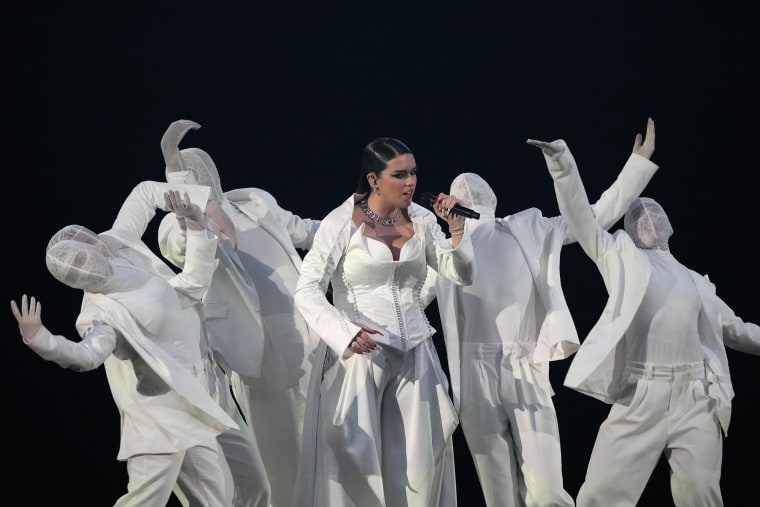
She is the second artist tonight to make an apparent reference onstage to tensions surrounding the contest, after Ireland’s Bambie Thug earlier shouted: “Love will always triumph hate.”
An intense fandom
MALMÖ, Sweden — It’s easy to think Eurovision just takes place for a few nights in May, but for die-hard fans, the season began months ago when countries started to hold their national selections.
And it continued with massive pre-parties across Europe. Thousands of fans turned out in Amsterdam, London, Madrid, Barcelona and elsewhere to get their first glimpse at this year’s contestants and see performances from previous acts.
Luke Black, who represented Serbia in last year’s Eurovision, said he wasn’t aware of the pre-party circuit before participating, but learned it was a crucial bit of the contest’s infrastructure that allowed him to build buzz.
“Eurovision is quite fast and you only have three minutes,” Black said. “So if I only left it to that … people wouldn’t have gotten to know me.”
“I think they’re quite important. … They give the fuel to the machinery of the fandom. If they like you, they like you … and they support you. They defend you.”
In a Eurovision first, Windows95man emerges partially naked from giant denim egg
In an interview with NBC News in Malmö on Wednesday, Windows95man, real name Teemu Keisteri, said he was expecting executives at Finnish television to balk at his staging ideas, but instead he had to rein them in.
“They listed all my ideas and did those like 10 times more crazy, and I had to push them down all the time,” he said, adding they wanted him “fully naked without any shirt, anything. And I was like, no, no, no, this is not my character anymore. Like this goes too — this is too much.”
Keisteri says he’s not nervous about performing on such a massive stage.
“We were doing this for art. And we can be really relaxed,” he said. “We have nothing to lose — absolutely nothing to lose.”
Gåte blend rock music with Norwegian folklore
MALMÖ, Sweden — Gåte guitarist Magnus Børmark told NBC News that the band bases “all our music on Norwegian Old Norse folklore, folk music and myths.”
The lyrics of “Ulveham” tell the story of a girl turned into a wolf by her evil stepmother.
That is paired with traditional animal calls used on farms. “It’s not aesthetic music,” Børmark said, instead it’s “music as a tool to communicate throughout the mountains and communicate with the animals and bring them back to the farm. So it’s just like a strong nonverbal communication.”
He says the pairing “evokes some really strong feelings” that gave him goosebumps.
Gåte is an established band, but Børmark said Eurovision has provided them with new fans. “For us, it just opened up a whole new world of people that are really welcoming, warm and always invites new acts that are different to join, to join the whole community.”
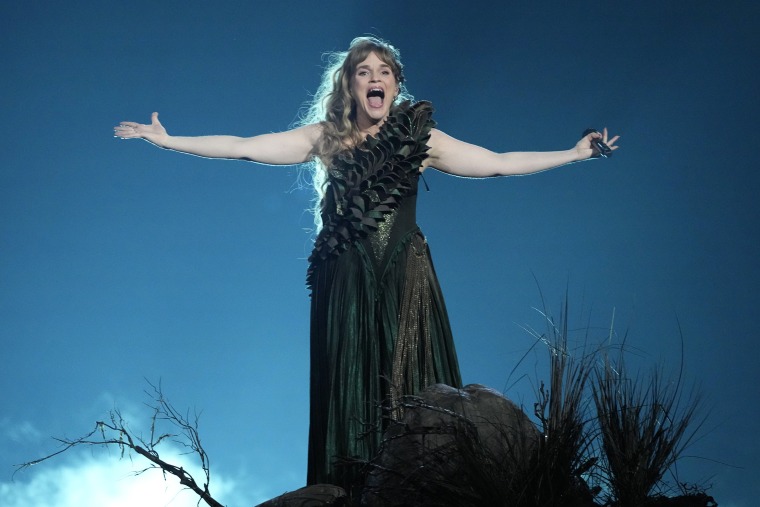
Who is Lynda Woodruff?
MALMÖ, Sweden — This skit features a recurring Eurovision character, Lynda Woodruff. She purports to be an official spokesperson for the European Broadcasting Union (EBU), which runs the contest, but is a clueless buffoon, butchering pronunciations and getting facts wrong.
In reality, she’s Swedish singer and actor Sarah Dawn Finer, who has been playing the role since 2012. In an interview this morning, Finer, whose father is British, told NBC News the character’s voice is based on the narrator for a “really bad” British reality show called “Ibiza Uncovered,” along with influence from British comedian Catherine Tate and British comedy show “Little Britain.”
The skit features a musical ode to Eurovision executive supervisor Martin Österdahl, who has made his catchphrase “you’re good to go” when telling the competition hosts that the vote has been verified and that they may now announce the vote results.
Finer said part of Lynda Woodruff’s appeal is that even if people don’t understand every reference that is being made in the skit, the silliness of the character can amuse viewers. “If something’s funny, it’s funny.”
Greek performance features TikTok nod
Marina Satti of Greece performed “ZARI,” featuring an apparent nod to TikTok’s role in the music industry. The high-energy dance was framed by what appeared to be a TikTok livestream border.
Olly Alexander’s gravity-defying dizzy spell
Olly Alexander, representing the U.K., takes to the stage to perform “Dizzy.”
The boppy performance features a group of men in red boxing shorts doing choreography alongside Alexander, at some points hanging upside down.
Alexander has spoken about facing criticism for choosing to remain in Eurovision, amid boycott calls over Israel’s participation in the competition.
Alexander was among the artists who issued a statement in March after a group called group Queers for Palestine signed an open letter asking the pop singer to withdraw.
“We firmly believe in the unifying power of music, enabling people to transcend differences and foster meaningful conversations and connections,” Alexander and other participating artists said in response.
‘Love will always triumph’ shouts Ireland’s Bambie Thug, after filing complaint to organizers
After missing the final dress rehearsal, the artist representing Ireland, Bambie Thug, has taken the stage to perform.
Addressing their earlier absence in an Instagram story, Bambie Thug said there was a “situation while we were waiting to go to stage for the flag parade rehearsal which I felt needed urgent attention from the EBU — the EBU have taken this matter seriously and we have been in a discussion about what action needs to be taken.”
They later posted another update, saying they raised “multiple complaints to the EBU” regarding “instances” they said they experienced this week, including one involving a commentator from Israeli broadcaster KAN.
“They confirmed to my delegation in front of others that KAN’s commentator had broken the rules of conduct during the Eurovision Semi-Final 1,” Bambie Thug said. “I have been patiently awaiting to hear what action is set to be taken by the EBU following this rule break.”
A spokesperson for KAN declined to comment.
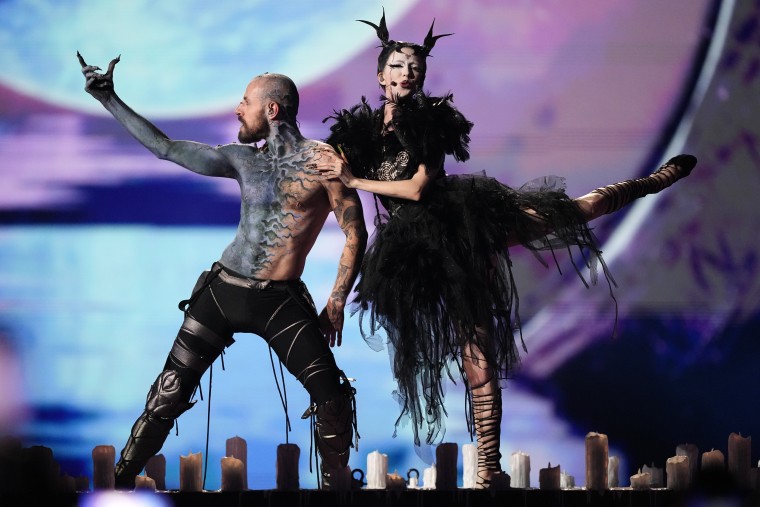
After their Grand Final performance, the artist shouted: “Love will always triumph hate.”
Spain masters synth-pop
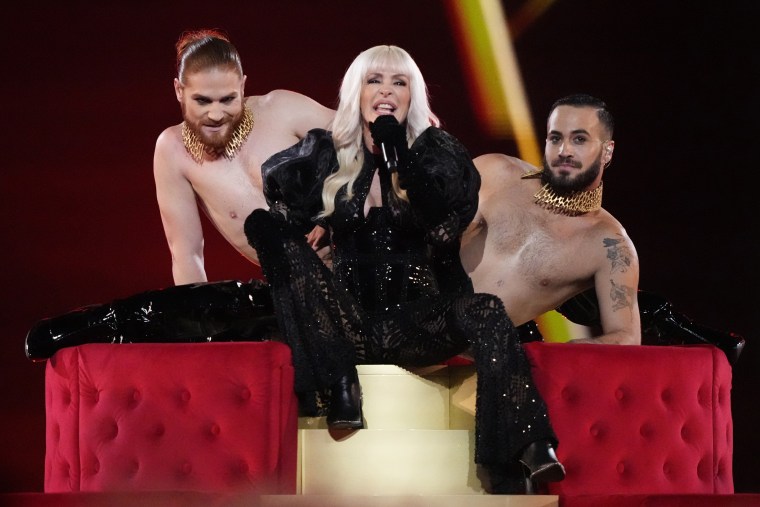
Nebulossa of Spain brought ’80s synth-pop to the Eurovision stage with their song “ZORRA.” The song garnered audience participation, with many in the crowd chanting along with the energetic performance.
Voting segment faces dropouts over Israel tensions and Dutch controversy
Even as the contest takes place, controversies continue to have an effect behind the scenes.
Dutch broadcaster AVROTROS confirmed that YouTuber and makeup guru Nikkie de Jager will no longer hand out the country’s points during the voting sequence later this evening, after the disqualification of Dutch entrant Joost Klein.
In a social media post, de Jager said: “I expected tonight to be something completely different. Let’s hope in future music will actually unite us all.”
The Finnish rapper Käärijä, who came second in last year’s contest, also pulled out of handing out Finland’s points during the voting.
The artist said in an Instagram post that “giving out the points tonight does not feel right” as tensions remain high around the contest.
Alessandra, who was due to represent Norway in the voting, also pulled her participation.
Referencing Israel’s war in Gaza, she said: “United By Music, Eurovision’s motto, is the reason I do music. Unite people, bring them together. But right now those words are just empty words.”
Up next: Lithuania
MALMÖ, Sweden — Lithuanian singer Silvester Belt’s “Luktelk” is a song that was inspired by the homophobia he experienced growing up. The title means “wait” or “hold on” and Belt says the performance “is based on the lyrics and there’s this blue and red side.” The colors are represented visually onstage.
“So, it’s kind of that two sides of you. The one that’s trying to find motivation to go through the episode that you’re going through and the other one is struggling. And then yeah, it’s kind of like a dance between these two.”
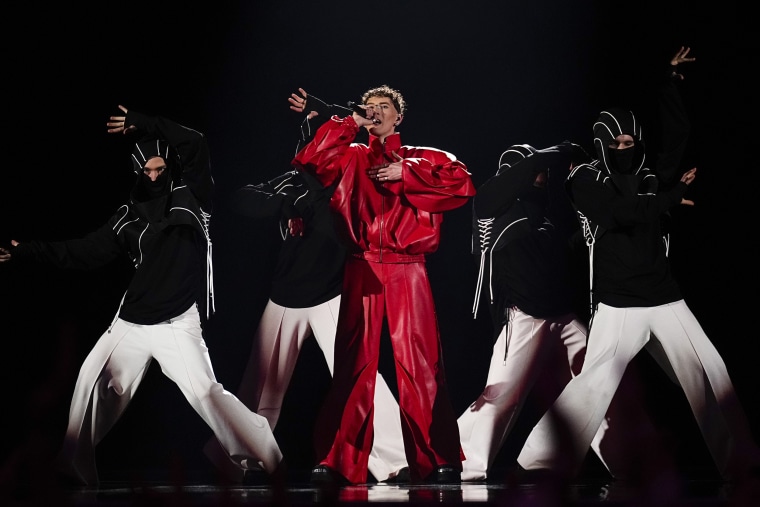
He said “my first movement is like this kicking, and I can’t, I don’t want to dance but I have to dance. This very powerful thing for me is the highlight probably of the song, I just kind of let go of everything.”
Booing and cheers as Israel’s Eden Golan takes the stage
MALMÖ, Sweden — Eden Golan of Israel performed her emotional ballad “Hurricane” on the Eurovision stage. Outside the arena, thousands protested Israel’s inclusion in the contest.
Golan’s performance received a mixed response within the arena, with booing amid the cheers. Some fans waved Israeli flags during the performance.
Security guards earlier made spot checks on flags and scarves being brought into the arena.
Why does Israel take part in Eurovision, and who can enter the contest?
Israel’s participation in this year’s Eurovision Song Contest has sparked boycotts from fans and some criticism from competing artists as the country’s war in Gaza continues.
While geographically in the Middle East rather than Europe, Israel has been a fixture of the song contest for decades, first taking part in 1973. Other nations not typically considered part of Europe — such as Morocco and Armenia — have also competed at Eurovision.
Under the contest’s long-standing rules, countries within the European Broadcasting Area are technically eligible to compete — a boundary that includes swaths of North Africa, as well as parts of the Middle East. This means that Egypt, Lebanon and Libya are technically also within the boundary that could see them take part in Eurovision, though none have ever done so.
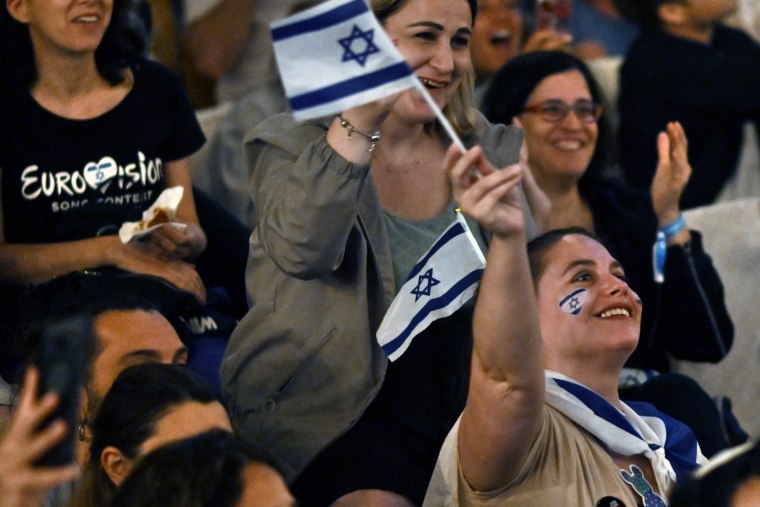
Eurovision has a strong following in Israel, however, and the nation has won the contest on four occasions and hosted three times.
The contest has loosened its geographical restrictions further in recent years, allowing Australia to compete for the first time in 2015, initially on a one-off basis in recognition of the contest’s popularity among audiences there. Australia has since been admitted as a permanent member.
Up next: Luxembourg
MALMÖ, Sweden — It’s been 31 years since Luxembourg has competed at Eurovision.
“It’s huge. A little bit of pressure, that’s for sure. But also so much pride, so much honor,” Tali, who wasn’t born the last time Luxembourg competed, told NBC News in an interview this week. “I can’t believe I’m here and it’s really so exciting.”
She said the song took her back to her time living in New York, when she was “a college student with three jobs, struggling to pay rent, trying to be an artist, You know, getting rejected constantly. And so it was this battle that I was like, should I keep going for this dream? Should I give up? Am I good enough?”
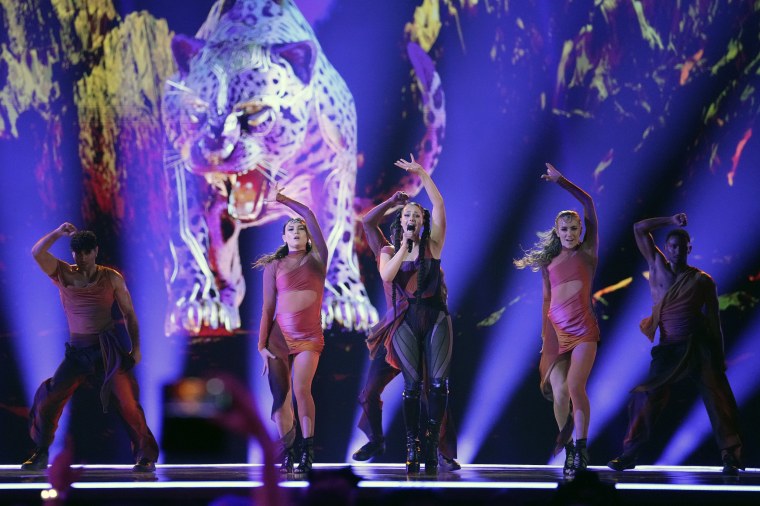
Tali added that “if it wasn’t for those moments where I wanted to give up, I wouldn’t be here right now. And so it makes me so emotional that I get to sing those lyrics on that stage over there.”
Duo from Ukraine give ethereal performance
The performers from Ukraine, Alyona Alyona & Jerry Heil, brought the house down in Malmö with a transcendent performance of their song “Teresa & Maria.” Their flowy gowns could have been part of Taylor Swift’s “Folklore” set on “The Eras Tour.”
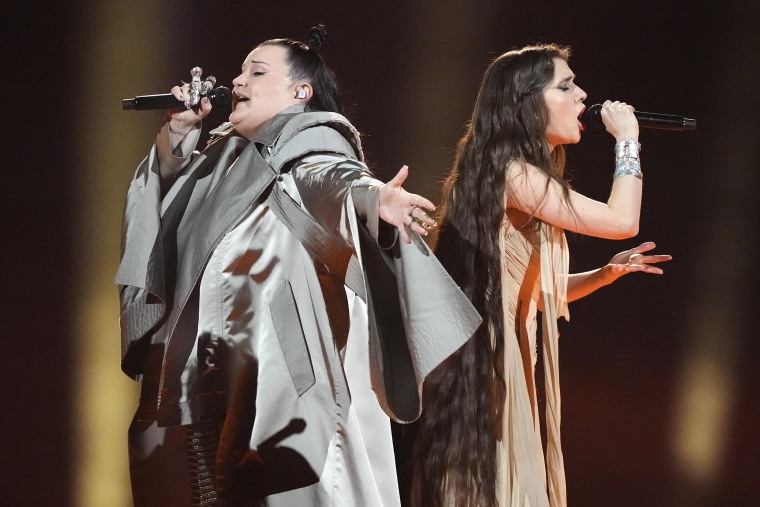
Up first: Sweden
MALMÖ, Sweden — Host nation Sweden kicks off the contest, the first of 25 competing entries tonight.
Flag parade sees cheers and boos for Israel’s Eden Golan
MALMÖ, Sweden — Despite a plea from organizers not to boo competing artists, audible booing could be heard inside the arena, as well as some cheers, when Israel’s Eden Golan emerged carrying her nation’s flag during the parade of participating artists. Israel’s continued participation in the contest has ignited protests over the nation’s war in Gaza.
Meanwhile, Switzerland’s Nemo — one of two nonbinary artists competing in tonight’s Grand Final — emerged carrying both a Swiss flag and a nonbinary flag.
Eurovision kicks off as protests continue outside arena
MALMÖ, Sweden — The Eurovision Grand Final has begun in Malmö, opening with a message from Victoria, Crown Princess of Sweden, and a montage celebrating host nation Sweden.
Protests over Israel’s inclusion in the contest continue outside Malmö Arena. There have also been tensions inside, with fans booing organizers ahead of the broadcast.
How to vote in the Eurovision Grand Final
In the Grand Final round, audiences can vote for the duration of the performances, shortly before the first song until about 25 to 40 minutes after the last song.
Each performance is evaluated by a jury of music industry professionals as well as viewers watching the show. Viewers can vote by telephone, text message or through the official Eurovision app. You cannot vote for your own country.
Even if your country isn’t participating, you can still vote for your favorite song. Eurovision allows anyone in the world to vote on its website for a fee of 1 euro ($1.08).
Contestants eye coveted glass microphone prize
The winner of the Eurovision Song Contest will take home the iconic glass microphone, which Eurovision has given out since 2008.
No live instruments at Eurovision
MALMÖ, Sweden — While the vocals at Eurovision must be performed live onstage, the music you hear in songs is not actually coming from the instruments onstage.
In an interview in Malmö this week, John Stenersen, who plays key harp in Gåte, told NBC News that “it’s kind of weird to see your fingers but the sound doesn’t come from your instrument. But it looks correct. The right timing and everything.”
His bandmate Magnus Børmark, who plays guitar, added, “We’re so physical onstage, and we have all this dancing going on anyway and now we can focus on that. But it has also made us realize the value of the movement and how we synchronize and how our movements actually express our song and how important it is for the total experience of the act.”
Alcazar to reunite for performance during final
MALMÖ, Sweden — Fans can look forward to a performance from last year’s Eurovision winner Loreen, and a reunion for the Swedish pop group Alcazar, known for tracks like “Crying at the Discoteque.”
A history of the Eurovision Song Contest
Known for its glitz, glamor and eccentricity, the Eurovision Song Contest will attract millions of viewers from across the globe when the Grand Final begins Saturday in Malmö, Sweden.
But a show that has become compulsory annual viewing for many has more humble beginnings as an attempt to heal the wounds of post-World War II Europe, while also achieving the technological marvel of beaming live television pictures into countries across the continent.
“This was really an experiment in the nascent technology of television,” historian Dean Vuletic told NBC News last month about the competition, which was first held in the picturesque Swiss city of Lugano in 1956 — as TV sets first became a fixture in people’s homes.
Eurovision: A look back at past winners
The reigning champion of Eurovision is Sweden’s Loreen, who took home her second trophy in 2023 for the song “Tattoo,” more than a decade after she won the 2012 contest with “Euphoria.”
Some of the biggest names in music are among Eurovision’s pantheon of past winners. Céline Dion claimed a Eurovision trophy for Switzerland in 1988 with her song “Ne partez pas sans moi,” while Ireland’s Johnny Logan and the U.K.’s Lulu are among the celebrated artists in their home countries to have brought home trophies.
Who is this year’s front-runner?
The odds currently favor a Croatia victory, but as with any live performance, anything can happen. The artist from Croatia, Baby Lasagna, will sing “Rim Tim Tagi Dim,” a song about a farm boy who leaves his home in the country for more opportunities in a city.
Israel, Switzerland, France and Ukraine round out the top five countries favored to win it all during Saturday’s Grand Final.
Pro-Palestinian protests continue at Eurovision
Eurovision’s LGBTQ contestants make their mark
LGBTQ inclusion is broader than ever at the spectacularly campy Eurovision, held this year in Sweden against a backdrop of unrest over Israel’s participation.
Eight of this year’s performers are part of the LGBTQ community, including three who identify as nonbinary, marking a new queer milestone in the long-running high-drama annual contest that’s often called “Queer Christmas” by superfans.
Thursday’s performers included Denmark’s Saba, an Ethiopian-born queer woman and advocate for those with mental health challenges; Belgium’s Mustii, who identifies as queer and serves as a judge on “RuPaul’s Drag Race Belgium”; and Switzerland’s Nemo, whose song “The Code” is an anthem to their acceptance of their nonbinary identity, and is a strong contender to take the top prize at Saturday’s final.
Read more here.
Malin Åkerman and Petra Mede serve as co-hosts
Actor Malin Åkerman and television host Petra Mede have been hyping up Eurovision fans as this year’s official co-hosts.
It’s Mede’s third time hosting Eurovision. Åkerman was born in Stockholm and raised in Canada.
Ireland’s Bambie Thug says they ‘raised multiple complaints’ to EBU
MALMÖ, Sweden — Bambie Thug, Ireland’s Eurovision Song Contest entrant, did not perform in Dress Rehearsal 3, Eurovision organizers confirmed Saturday.
“They missed the dress rehearsal due to a situation that is currently being discussed with the EBU and Song Contest organizers,” the European Broadcasting Union (EBU), which runs the competition, said in a statement. “We hope that this will be resolved shortly and Bambie Thug will appear in the Grand Final Show as planned.
Bambie Thug had reportedly called on organizers to address commentary made on Israeli television before their performance in Tuesday’s semifinal.
In a post to their Instagram story, Bambie Thug addressed their fans, saying there “was a situation while we were waiting to go to stage for the flag parade rehearsal which I felt needed urgent attention from the EBU — the EBU have taken this matter seriously and we have been in a discussion about what action needs to be taken.”
Bambie Thug shared another update on their Instagram story as the final approached, saying they “raised multiple complaints to the EBU” regarding “instances” they said they experienced this week, including one involving a KAN commentator. (KAN is Israeli public radio’s English-language news).
“They confirmed to my delegation in front of others that KAN’s commentator had broken the rules of conduct during the Eurovision Semi-Final 1,” Bambie Thug wrote. “I have been patiently awaiting to hear what action is set to be taken by the EBU following this rule break.”
A spokesperson for KAN declined to comment.
Israeli singer Eden Golan ‘overwhelmed’ after advancing
Israeli singer Eden Golan said she was “overwhelmed with emotions” after she qualified for the grand final with her song “Hurricane.”
“It’s truly such an honor to be here, onstage, performing and showing our voice and representing us with pride,” Golan said during a news conference.
Thousands took to the streets to protest Israel’s inclusion in the contest.
When asked about whether her presence poses security risks and danger for other participants and public, Golan said she thinks “we’re all here for one reason and one reason only.”
“The EBU is taking precautions to make this a safe and united place for everyone,” she said.
The view from outside Malmö Arena
MALMÖ, Sweden — Eurovision fans are already gearing up for the Grand Final.
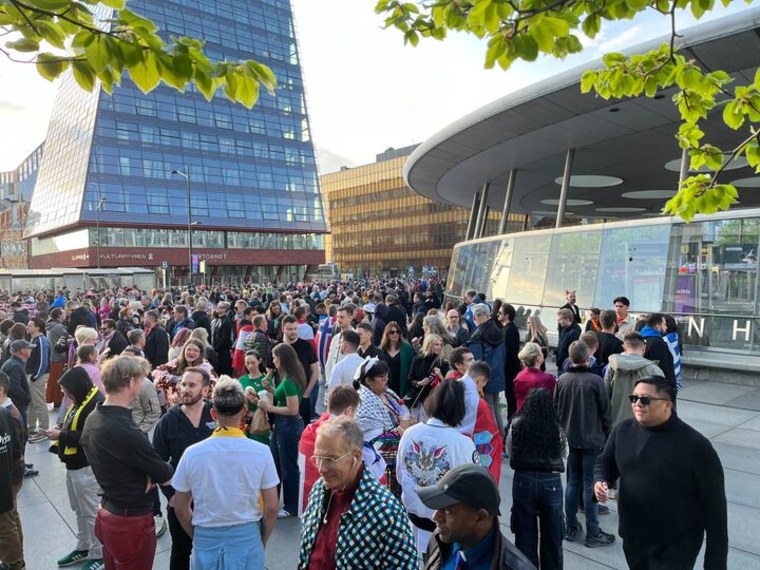
With less than two hours before the final day of the competition begins, crowds formed outside Malmö Arena waiting to go in.
What you missed during semifinals
MALMÖ, Sweden — Eleven countries failed to make it past the semifinals earlier this week. That includes Australia, whose entrant Electric Fields showcased Yankunytjatjara, an Aboriginal Australian language, in its track “One Milkali (One Blood).” Also cut was San Marino entrant Megara, who failed to break the microstate’s track record of woe, having only qualified for the final three times since 2008.
Irish Eurovision legend Johnny Logan, a two-time winner of the contest, made a special appearance during Tuesday’s semifinal for a tribute to reigning champion Loreen, performing her 2012 track “Euphoria.”
A lighter moment during Thursday’s semifinal saw co-host Petra Mede perform the specially written song “We Just Love Eurovision Too Much,” in which host nation Sweden apologized for its record of repeatedly winning and hosting Eurovision.
Thousands protest against Israel’s inclusion in Eurovision
Israel’s participation in this year’s Eurovision Song Contest has sparked boycotts from fans and some criticism from competing artists as the country’s war in Gaza continues.
While geographically in the Middle East rather than Europe, Israel has been a fixture of the song contest for decades, first taking part in 1973. Other nations not typically considered part of Europe — such as Morocco and Armenia — have also competed at Eurovision.
Under the contest’s long-standing rules, countries within the European Broadcasting Area are technically eligible to compete — a boundary that includes swaths of North Africa, as well as parts of the Middle East. This means that Egypt, Lebanon and Libya are technically also within the boundary that could see them take part in Eurovision, though none have ever done so.
Eurovision has a strong following in Israel, however, and the nation has won the contest on four occasions and hosted three times. The contest has loosened its geographical restrictions further in recent years, allowing Australia to compete for the first time in 2015, initially on a one-off basis in recognition of the contest’s popularity among audiences there. Australia has since been admitted as a permanent member.
Who are the Eurovision finalists?
The full running order of tonight’s final is:
- Sweden — Marcus & Martinus, “Unforgettable”
- Ukraine — Alyona Alyona and Jerry Heil, “Teresa & Maria”
- Germany — Isaak, “Always on the Run”
- Luxembourg — Tali, “Fighter”
- There will be no song in position number 5 after the Netherlands was removed from the finals. In a statement the EBU said it “will inform all telecommunications partners that the Netherlands is no longer participating, and we will endeavor to block the lines for Song 5.”
- Israel — Eden Golan, “Hurricane”
- Lithuania — Silvester Belt, “Luktelk”
- Spain — Nebulossa, “Zorra”
- Estonia — 5miinust and Puuluup, “(Nendest) narkootikumidest ei tea me (küll) midagi”
- Ireland — Bambie Thug, “Doomsday Blue”
- Latvia — Dons, “Hollow”
- Greece — Marina Satti, “Zari”
- United Kingdom — Olly Alexander, “Dizzy”
- Norway — Gåte, “Ulveham”
- Italy — Angelina Mango, “La noia”
- Serbia — Teya Dora, “Ramonda”
- Finland — Windows95man, “No Rules!”
- Portugal — Iolanda, “Grito”
- Armenia — Ladaniva, “Jako”
- Cyprus — Silia Kapsis, “Liar”
- Switzerland — Nemo, “The Code”
- Slovenia — Raiven, “Veronika”
- Croatia — Baby Lasagna, “Rim Tim Tagi Dim”
- Georgia — Nutsa Buzaladze, “Firefighter”
- France — Slimane, “Mon amour”
- Austria — Kaleen, “We Will Rave”
Netherlands’ contestant Joost Klein kicked out ahead of final
The European Broadcasting Union, which organizes Eurovision, expelled Joost Klein, the Netherlands’ contestant, from the competition hours before Saturday’s final over a backstage incident.
Swedish police said they were investigating “a complaint made by a female member of the production crew” about Klein, a Dutch musician, rapper, singer and former YouTuber.
What to expect from the Eurovision Grand Final
MALMÖ, Sweden — Of the 37 countries that entered this year’s Eurovision, 26 of them made it through to compete in tonight’s Grand Final. (However, the Netherlands’ Eurovision contestant, Joost Klein, was kicked out hours before the final.)
The contest sees an artist or group from each competing country perform an original song in a bid to win over viewers at home. The results of a public televote are combined with scores allocated by international juries of music experts in each country to decide the winners and losers of the night.
How long is the Eurovision Grand Final?
The Grand Final kicks off at 8 p.m. local time or 3 p.m. ET.
The show is scheduled to end at 7 p.m. ET, but the voting process tends to run long. So get ready to stay up a bit later than expected.
How to watch the Eurovision 2024 Grand Final
The U.S. streaming home of Eurovision is Peacock, where viewers can watch the finals live at 3 p.m. ET. (Comcast is the parent company of both NBC News and NBCUniversal, which runs Peacock.)
In Europe, the finals will be broadcast on various publicly owned stations, including the BBC in Britain.








